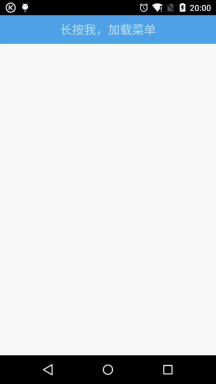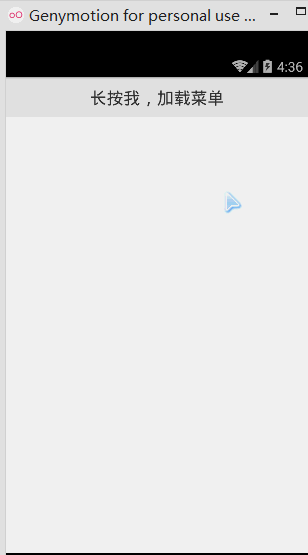本节引言:
1.HttpURLConnection的介绍
2.HttpURLConnection的使用步骤
使用HttpURLConnection的步骤如下:
PS:除了上面这些外,有时我们还可能需要对响应码进行判断,比如200: if(conn.getResponseCode() != 200)然后一些处理 还有,可能有时我们 并不需要传递什么参数,而是直接去访问一个页面,我们可以直接用: final InputStream in = new URL("url").openStream(); 然后直接读流,不过这个方法适合于直接访问页面的情况,底层实现其实也是 return openConnection().getInputStream(),而且我们还不能设置一些 请求头的东东,所以要不要这样写,你自己要掂量掂量!
3.HttpURLConnection使用示例
StreamTool.java:
/**
* Created by Jay on 2015/9/7 0007.
*/
public class StreamTool {
//从流中读取数据
public static byte[] read(InputStream inStream) throws Exception{
ByteArrayOutputStream outStream = new ByteArrayOutputStream();
byte[] buffer = new byte[1024];
int len = 0;
while((len = inStream.read(buffer)) != -1)
{
outStream.write(buffer,0,len);
}
inStream.close();
return outStream.toByteArray();
}
}
接下来就可以开始撸我们的示例了!
1)HttpURLConnection发送GET请求代码示例
运行效果图:

核心部分代码:
布局:activity_main.xml
<LinearLayout xmlns:android="http://schemas.android.com/apk/res/android"
android:layout_width="match_parent"
android:layout_height="match_parent"
android:orientation="vertical">
<TextView
android:id="@+id/txtMenu"
android:layout_width="match_parent"
android:layout_height="48dp"
android:background="#4EA9E9"
android:clickable="true"
android:gravity="center"
android:text="长按我,加载菜单"
android:textSize="20sp" />
<ImageView
android:id="@+id/imgPic"
android:layout_width="match_parent"
android:layout_height="match_parent"
android:visibility="gone" />
<ScrollView
android:id="@+id/scroll"
android:layout_width="match_parent"
android:layout_height="match_parent"
android:visibility="gone">
<TextView
android:id="@+id/txtshow"
android:layout_width="wrap_content"
android:layout_height="wrap_content" />
</ScrollView>
<WebView
android:id="@+id/webView"
android:layout_width="match_parent"
android:layout_height="match_parent" />
</LinearLayout>
获取数据类:GetData.java:
/**
* Created by Jay on 2015/9/7 0007.
*/
public class GetData {
// 定义一个获取网络图片数据的方法:
public static byte[] getImage(String path) throws Exception {
URL url = new URL(path);
HttpURLConnection conn = (HttpURLConnection) url.openConnection();
// 设置连接超时为5秒
conn.setConnectTimeout(5000);
// 设置请求类型为Get类型
conn.setRequestMethod("GET");
// 判断请求Url是否成功
if (conn.getResponseCode() != 200) {
throw new RuntimeException("请求url失败");
}
InputStream inStream = conn.getInputStream();
byte[] bt = StreamTool.read(inStream);
inStream.close();
return bt;
}
// 获取网页的html源代码
public static String getHtml(String path) throws Exception {
URL url = new URL(path);
HttpURLConnection conn = (HttpURLConnection) url.openConnection();
conn.setConnectTimeout(5000);
conn.setRequestMethod("GET");
if (conn.getResponseCode() == 200) {
InputStream in = conn.getInputStream();
byte[] data = StreamTool.read(in);
String html = new String(data, "UTF-8");
return html;
}
return null;
}
}
MainActivity.java:
public class MainActivity extends AppCompatActivity {
private TextView txtMenu, txtshow;
private ImageView imgPic;
private WebView webView;
private ScrollView scroll;
private Bitmap bitmap;
private String detail = "";
private boolean flag = false;
private final static String PIC_URL = "https://ww2.sinaimg.cn/large/7a8aed7bgw1evshgr5z3oj20hs0qo0vq.jpg";
private final static String HTML_URL = "https://www.baidu.com";
// 用于刷新界面
private Handler handler = new Handler() {
public void handleMessage(android.os.Message msg) {
switch (msg.what) {
case 0x001:
hideAllWidget();
imgPic.setVisibility(View.VISIBLE);
imgPic.setImageBitmap(bitmap);
Toast.makeText(MainActivity.this, "图片加载完毕", Toast.LENGTH_SHORT).show();
break;
case 0x002:
hideAllWidget();
scroll.setVisibility(View.VISIBLE);
txtshow.setText(detail);
Toast.makeText(MainActivity.this, "HTML代码加载完毕", Toast.LENGTH_SHORT).show();
break;
case 0x003:
hideAllWidget();
webView.setVisibility(View.VISIBLE);
webView.loadDataWithBaseURL("", detail, "text/html", "UTF-8", "");
Toast.makeText(MainActivity.this, "网页加载完毕", Toast.LENGTH_SHORT).show();
break;
default:
break;
}
}
;
};
@Override
protected void onCreate(Bundle savedInstanceState) {
super.onCreate(savedInstanceState);
setContentView(R.layout.activity_main);
setViews();
}
private void setViews() {
txtMenu = (TextView) findViewById(R.id.txtMenu);
txtshow = (TextView) findViewById(R.id.txtshow);
imgPic = (ImageView) findViewById(R.id.imgPic);
webView = (WebView) findViewById(R.id.webView);
scroll = (ScrollView) findViewById(R.id.scroll);
registerForContextMenu(txtMenu);
}
// 定义一个隐藏所有控件的方法:
private void hideAllWidget() {
imgPic.setVisibility(View.GONE);
scroll.setVisibility(View.GONE);
webView.setVisibility(View.GONE);
}
@Override
// 重写上下文菜单的创建方法
public void onCreateContextMenu(ContextMenu menu, View v, ContextMenu.ContextMenuInfo menuInfo) {
MenuInflater inflator = new MenuInflater(this);
inflator.inflate(R.menu.menus, menu);
super.onCreateContextMenu(menu, v, menuInfo);
}
// 上下文菜单被点击是触发该方法
@Override
public boolean onContextItemSelected(MenuItem item) {
switch (item.getItemId()) {
case R.id.one:
new Thread() {
public void run() {
try {
byte[] data = GetData.getImage(PIC_URL);
bitmap = BitmapFactory.decodeByteArray(data, 0, data.length);
} catch (Exception e) {
e.printStackTrace();
}
handler.sendEmptyMessage(0x001);
}
;
}.start();
break;
case R.id.two:
new Thread() {
public void run() {
try {
detail = GetData.getHtml(HTML_URL);
} catch (Exception e) {
e.printStackTrace();
}
handler.sendEmptyMessage(0x002);
};
}.start();
break;
case R.id.three:
if (detail.equals("")) {
Toast.makeText(MainActivity.this, "先请求HTML先嘛~", Toast.LENGTH_SHORT).show();
} else {
handler.sendEmptyMessage(0x003);
}
break;
}
return true;
}
}
最后别忘了加上联网权限:
<uses-permission android:name="android.permission.INTERNET" />
注意事项:
2)HttpURLConnection发送POST请求代码示例
运行效果图:

核心代码:
PostUtils.java
public class PostUtils {
public static String LOGIN_URL = "http://172.16.2.54:8080/HttpTest/ServletForPost";
public static String LoginByPost(String number,String passwd)
{
String msg = "";
try{
HttpURLConnection conn = (HttpURLConnection) new URL(LOGIN_URL).openConnection();
//设置请求方式,请求超时信息
conn.setRequestMethod("POST");
conn.setReadTimeout(5000);
conn.setConnectTimeout(5000);
//设置运行输入,输出:
conn.setDoOutput(true);
conn.setDoInput(true);
//Post方式不能缓存,需手动设置为false
conn.setUseCaches(false);
//我们请求的数据:
String data = "passwd="+ URLEncoder.encode(passwd, "UTF-8")+
"&number="+ URLEncoder.encode(number, "UTF-8");
//这里可以写一些请求头的东东...
//获取输出流
OutputStream out = conn.getOutputStream();
out.write(data.getBytes());
out.flush();
if (conn.getResponseCode() == 200) {
// 获取响应的输入流对象
InputStream is = conn.getInputStream();
// 创建字节输出流对象
ByteArrayOutputStream message = new ByteArrayOutputStream();
// 定义读取的长度
int len = 0;
// 定义缓冲区
byte buffer[] = new byte[1024];
// 按照缓冲区的大小,循环读取
while ((len = is.read(buffer)) != -1) {
// 根据读取的长度写入到os对象中
message.write(buffer, 0, len);
}
// 释放资源
is.close();
message.close();
// 返回字符串
msg = new String(message.toByteArray());
return msg;
}
}catch(Exception e){e.printStackTrace();}
return msg;
}
}
PS:因为电脑没装MyEclipse,而且时间关系,就不另外写demo了,用回之前的Eclipse的那个demo! 其实从直接看核心代码就够了~ 代码下载:HttpURLConnection例子.zip
4.Cookie问题的处理
5.使用HttpURLConnection发送PUT请求
public static String LoginByPut(Context mContext, String mobile, String password, int from,
String devid,String version_name, int remember_me) {
String resp = "";
try {
HttpURLConnection conn = (HttpURLConnection) new URL(LOGIN_URL).openConnection();
conn.setRequestMethod("PUT");
conn.setReadTimeout(5000);
conn.setConnectTimeout(5000);
conn.setDoOutput(true);
conn.setDoInput(true);
conn.setUseCaches(false);
String data = "mobile=" + mobile + "&password=" + password + "&from=" + from + "&devid=" + "devid"
+ "&version_name=" + "version_name" + "&remember_me=" + remember_me;
;
// 获取输出流:
OutputStreamWriter writer = new OutputStreamWriter(conn.getOutputStream());
writer.write(data);
writer.flush();
writer.close();
// 获取相应流对象:
InputStream in = conn.getInputStream();
BufferedReader reader = new BufferedReader(new InputStreamReader(in));
StringBuilder response = new StringBuilder();
String line;
while ((line = reader.readLine()) != null)
response.append(line);
SPUtils.put(mContext, "session", conn.getHeaderField("Set-Cookie"));
// 资源释放:
in.close();
// 返回字符串
Log.e("HEHE", response.toString());
return response.toString();
} catch (Exception e) {
e.printStackTrace();
}
return "";
}




